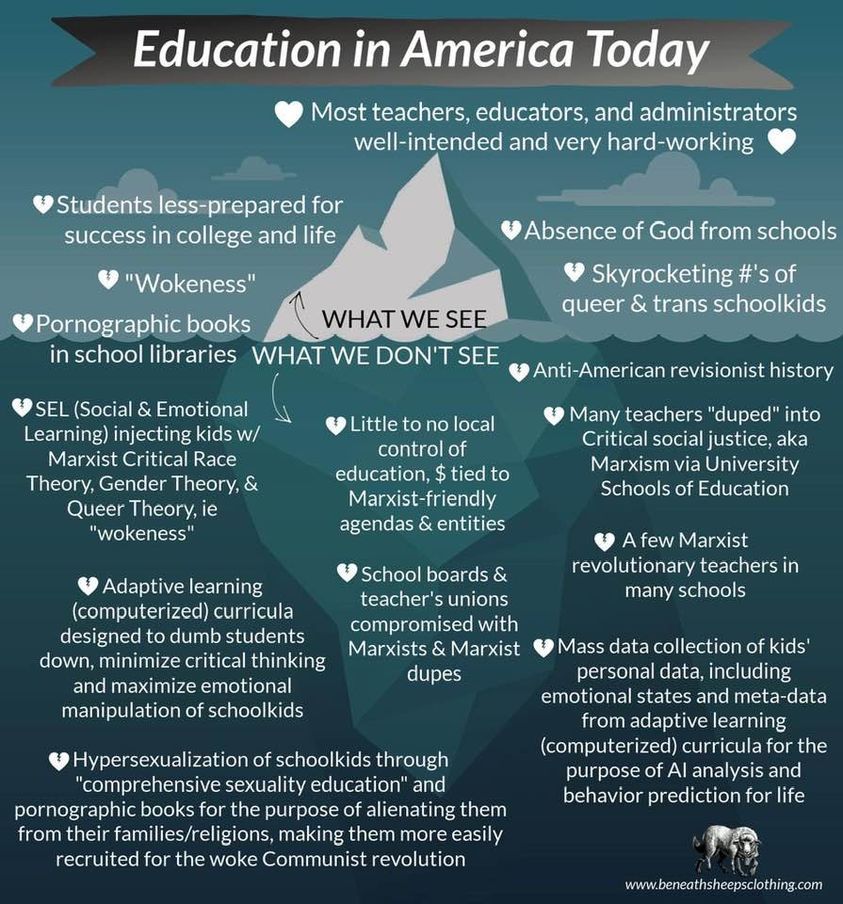The news roundup this week is minimal because of the holiday, which is both worth celebrating and worth being wary of. This summer, right-wing groups across the country are planning their fall strategies for censorship, and it is already gearing up to be a season worse than this last school year.
Rather than a rundown of the (tiny number of) news stories, here are a few things to think about and prepare for this week.
Moms For Liberty’s Agenda: Target Educator Social Media
You are likely already aware of the Twitter account that seeks out the public social media accounts of educators and librarians. We’ve covered the story of a state librarian who went missing–she is back at her post now–and the teacher who was pulled from her classroom pending a board meeting.
Now, Moms For Liberty is getting into the act, creating workshops to help educate their members about how to find public educator social media accounts. Because Moms operates on a county-by-county level, this means these radicalized individuals are in your community and looking for you. The below image is from Nueces, Texas, but such agendas are popping up across the US.
What this means is your social media, if it’s public, will be actively sought out by individuals eager to take down public education (again, this is not hyperbole). It will be exploited by these groups, and it will be blasted at school boards, across their social media, and throughout right-wing “news” outlets.
Social media has, of course, been an invaluable professional development tool for educators and librarians. This is counter, too, to everything worth believing about free speech. But if your livelihood is on the line and you do not want anything you say, however positive and inclusive it is, to be put on a billboard, you need to lock down your accounts.

The above image gives a chilling sense of what these groups are thinking and how they’re packaging their agenda. They believe wholeheartedly that public education is indoctrination, and they’re celebrating the latest Supreme Court decisions that allow for more prayer in schools, as well as the use of public money for religious education. It is, of course, fascinating how freedom of speech only applies to Christian prayer and not, for example, saying “gay” or allowing people to read whatever they want to read.
Call to Action
If you are in a role where your job is paid for by taxpayer money–public schools, public libraries, community colleges, and similar–you need to lock down your public social media accounts now. There are safer places to create your learning networks and share resources with one another, including in a private Slack, a private Facebook groups, list servs that are private and not linked to your work email accounts, private Discord servers, and the like. Ensure that anyone invited into these groups needs to be verified through either questions or personal invitation and make sure everyone agrees not to screen shot any discussions happening (it will still happen, so know that).
Then, do a privacy audit. This guide from Violet Blue is older, but it is a tremendous starting place for making sure your private information is not easily findable online. Set aside a couple of hours to do every task here, and find every place where your privacy is being compromised. Get any information you would not want blasted on a billboard removed as best you can. Get a post office box for mail and use that. Secure a phone number via Skype (they’re inexpensive) or Google Voice. These will be what you use when registering for anything anymore, as they will not be linked to your home or personal information.
More Newspapers Disappearing = More Books Being Banned
A new report from Northwestern University’s Medill Local News Initiative highlights the continued death of local newspapers. As discussed here before, the death of local news is detrimental for many reasons, one of which is that the loss of local news means more censorship stories fly under the radar of the communities in which they’re happening. Larger newspapers paywall content, if they cover stories in non-metro areas at all, creating ample opportunity for fake news to proliferate. If someone can Google a topic and hit paywalls for some stories but can get all of the fake stuff for free, there’s a reason they’re susceptible to the fake news:
The click economy is a major factor in the decline of local journalism, and it’s also why you don’t hear about the tremendous number of censorship stories happening on the local level every single day across America. Where there were once reporters or citizens sitting at civic meetings to see and share what’s happening, now those seats are empty and the stories go unheard.
As the new report describes, the loss of local news is detrimental for democracy. An average of two newspapers are closing each week, and rarely do those folding papers find themselves reemerging digitally. Moreover, the communities most in need of this check on democracy are the ones not seeing it. From the report:
The disparity between communities that have strong news organizations and those that don’t is primarily the result of market demographics, ownership structure and available funding. Whether print or digital, local news organizations that have entrepreneurial owners and are in affluent and/or growing communities with diverse sources of funding are much more likely to establish and maintain a successful for-profit, nonprofit or hybrid enterprise. Economically struggling and traditionally underserved communities—where residents need journalists providing transparency and oversight of local government and business decisions—are the ones most likely to lose a news organization and be overlooked by funders looking to invest in both for-profit and nonprofit news operations. That loss of local journalism exacerbates political, cultural and economic divisions between and within communities.
Call to Action
Read this report in full, and note especially where there are news deserts. While there are many groups (and individuals!) working hard to capture just how widespread book censorship is right now, it is impossible given the lack of factual reporting in many areas. In fact, the reason there are names you may recognize from smaller outlets in weekly roundups of this news is because those individuals have been supported enough to continue doing that vital work.
Not all communities are so lucky.
What can you do? Besides being informed, know where and how to spot fake news parading as truth. You’ll see it over and over in right-wing groups and right-wing rhetoric. Sites like the National Review (see above) and the Washington Examiner–which do often see stories “trending” on social media–are fake news. They draw tremendous click traffic, are free, and get spread far and wide through social media. Take the time to question what you read.
The School Board Project Update
Back in May, we introduced The School Board Project. The project aims to highlight every school district across the US, the next election for the school board, and how many seats will be available. You can access the background and first report here.
This is a two-person project at the moment, and we’re working hard to bring the next round of school boards live. We’ll have a batch of 7-10 states in the next few weeks.
For ways to take action against censorship, use this toolkit for how to fight book bans and challenges, as well as this guide to identifying fake news. Then learn how and why you may want to use FOIA to uncover book challenges.
Also In This Story Stream
- How To Directly Impact Democracy: Book Censorship News, July 1, 2022
- Librarian Vandalizes 2 Public Libraries, Spray Painting “Groomers”: Book Censorship News, June 24, 2022
- “Once the Books Start Coming Off the Shelves, We’ll See You In Court.”: Book Censorship News, June 17, 2022
- How Moms For Liberty’s Book Ratings System Enters Schools: Book Censorship News, June 10, 2022
- The Misinformation Age: Book Censorship News, June 3, 2022
- Business As Usual: Book Censorship News, May 27, 2022
- You Need To Talk About The Sex Parts in Banned Books: Book Censorship News, May 20, 2022
- The School Board Project, Round One: Book Censorship News, May 13, 2022
- How to Update Your Book Challenge Forms (with Template): Book Censorship News, May 6, 2022

